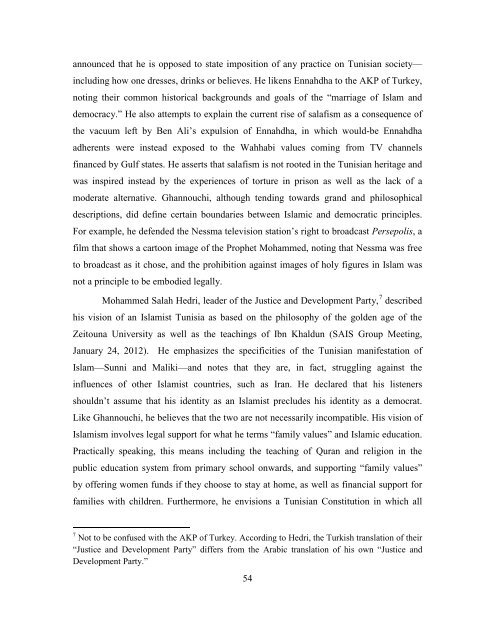Tunisia: Understanding Conflict 2012 - Johns Hopkins School of ...
Tunisia: Understanding Conflict 2012 - Johns Hopkins School of ...
Tunisia: Understanding Conflict 2012 - Johns Hopkins School of ...
Create successful ePaper yourself
Turn your PDF publications into a flip-book with our unique Google optimized e-Paper software.
announced that he is opposed to state imposition <strong>of</strong> any practice on <strong>Tunisia</strong>n society—<br />
including how one dresses, drinks or believes. He likens Ennahdha to the AKP <strong>of</strong> Turkey,<br />
noting their common historical backgrounds and goals <strong>of</strong> the “marriage <strong>of</strong> Islam and<br />
democracy.” He also attempts to explain the current rise <strong>of</strong> salafism as a consequence <strong>of</strong><br />
the vacuum left by Ben Ali’s expulsion <strong>of</strong> Ennahdha, in which would-be Ennahdha<br />
adherents were instead exposed to the Wahhabi values coming from TV channels<br />
financed by Gulf states. He asserts that salafism is not rooted in the <strong>Tunisia</strong>n heritage and<br />
was inspired instead by the experiences <strong>of</strong> torture in prison as well as the lack <strong>of</strong> a<br />
moderate alternative. Ghannouchi, although tending towards grand and philosophical<br />
descriptions, did define certain boundaries between Islamic and democratic principles.<br />
For example, he defended the Nessma television station’s right to broadcast Persepolis, a<br />
film that shows a cartoon image <strong>of</strong> the Prophet Mohammed, noting that Nessma was free<br />
to broadcast as it chose, and the prohibition against images <strong>of</strong> holy figures in Islam was<br />
not a principle to be embodied legally.<br />
Mohammed Salah Hedri, leader <strong>of</strong> the Justice and Development Party, 7 described<br />
his vision <strong>of</strong> an Islamist <strong>Tunisia</strong> as based on the philosophy <strong>of</strong> the golden age <strong>of</strong> the<br />
Zeitouna University as well as the teachings <strong>of</strong> Ibn Khaldun (SAIS Group Meeting,<br />
January 24, <strong>2012</strong>). He emphasizes the specificities <strong>of</strong> the <strong>Tunisia</strong>n manifestation <strong>of</strong><br />
Islam—Sunni and Maliki—and notes that they are, in fact, struggling against the<br />
influences <strong>of</strong> other Islamist countries, such as Iran. He declared that his listeners<br />
shouldn’t assume that his identity as an Islamist precludes his identity as a democrat.<br />
Like Ghannouchi, he believes that the two are not necessarily incompatible. His vision <strong>of</strong><br />
Islamism involves legal support for what he terms “family values” and Islamic education.<br />
Practically speaking, this means including the teaching <strong>of</strong> Quran and religion in the<br />
public education system from primary school onwards, and supporting “family values”<br />
by <strong>of</strong>fering women funds if they choose to stay at home, as well as financial support for<br />
families with children. Furthermore, he envisions a <strong>Tunisia</strong>n Constitution in which all<br />
7 Not to be confused with the AKP <strong>of</strong> Turkey. According to Hedri, the Turkish translation <strong>of</strong> their<br />
“Justice and Development Party” differs from the Arabic translation <strong>of</strong> his own “Justice and<br />
Development Party.”<br />
54
















